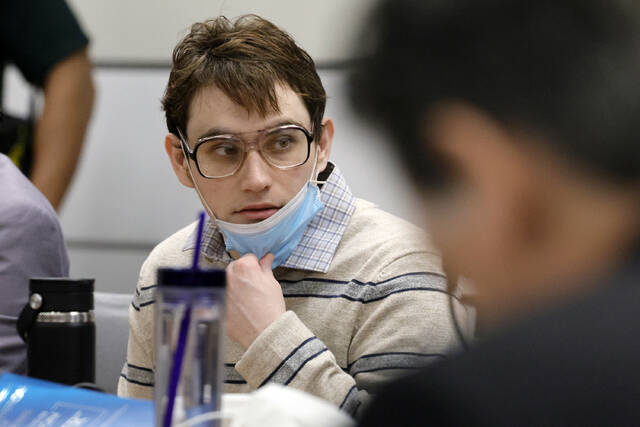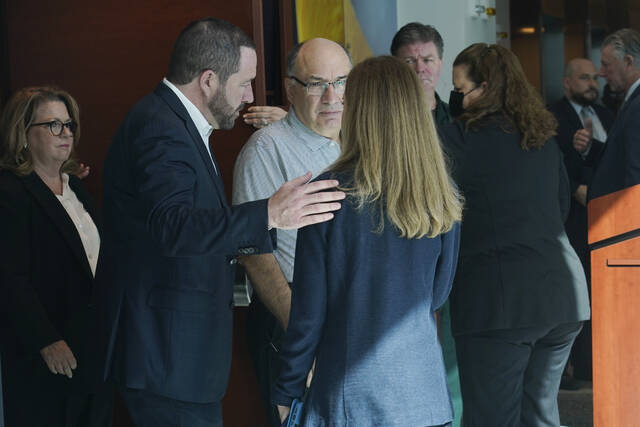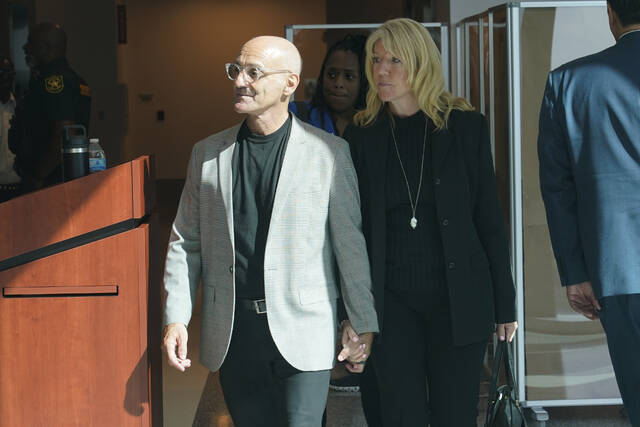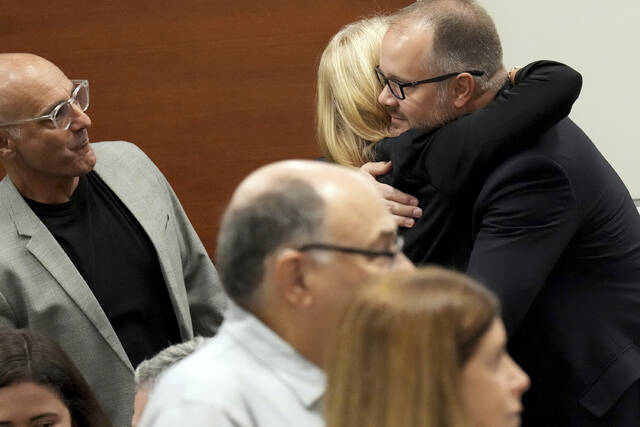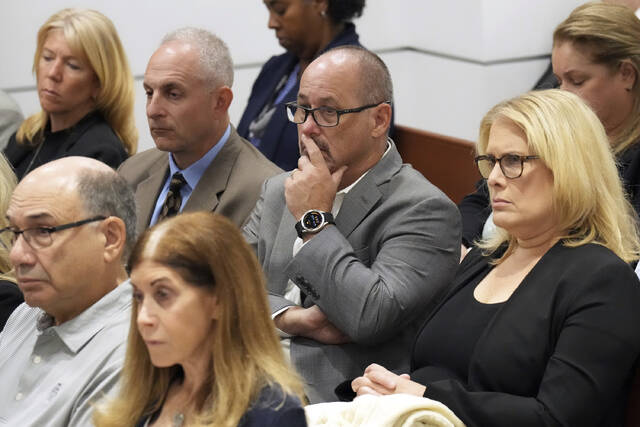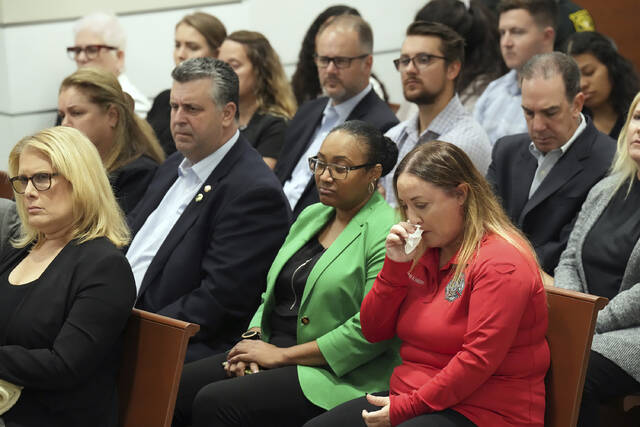Prosecutor makes final case for school shooter's execution
FORT LAUDERDALE, Fla. — The lead prosecutor of Florida school shooter Nikolas Cruz made his final push Tuesday to persuade jurors to sentence him to death, telling them during his closing argument that the 2018 attack that killed 17 people was cold, calculated and meticulously planned and deserving of execution.
Mike Satz said Cruz “was hunting his victims” as he stalked a three-story classroom building at Parkland’s Marjory Stoneman Douglas High School for seven minutes, firing his AR-15-style semiautomatic rifle into some victims at close range and returning to wounded victims as they lay helpless “to finish them off.”
He pointed to Cruz’s internet writings and videos, where he talked about his murderous desires such as when he wrote, “No mercy, no questions, double tap. I am going to kill a … ton of people and children.”
“It is said that what one writes and says is a window into their soul,” Satz said as the three-month trial neared its conclusion. The killings, he said, “were unrelentlessly heinous, atrocious and cruel.”
Cruz, 24, pleaded guilty a year ago to murdering 14 students and three staff members and wounding 17 others on Feb. 14, 2018. Cruz said he chose Valentine’s Day to make it impossible for Stoneman Douglas students to celebrate the holiday ever again. The jury will only decide whether he is sentenced to death or life without parole. A unanimous vote is required for a death sentence.
Cruz, dressed in an off-white sweater, sat impassively during Satz’s presentation, occasionally exchanging notes with his attorneys. His lead attorney, Melisa McNeill, will give her closing argument later Tuesday. Deliberations are expected to begin Wednesday.
A large number of the victims’ parents, wives and family members packed the section of the courtroom reserved for them, watching Satz intently, many of them weeping. The mother of a murdered 14-year-old girl fled the courtroom during Satz’s presentation before bursting into loud sobs in the hallway. Just minutes earlier, the families had greeted each other with smiles, handshakes and hugs.
Satz, who served as Broward County state attorney for 44 years before stepping down early last year, meticulously went through the murders, reminding the jurors in order of how the victims were slain and how Cruz looked some in the eye before he shot them multiple times.
“They all knew what was going on, what was going to happen,” Satz said.
He talked about the death of one 14-year-old girl. Cruz shot her and then went back to shoot her again, putting his gun against her chest.
“Right on her skin. She was shot four times and she died,” Satz said. He then noted a YouTube video, which jurors saw during the trial, in which Cruz said: “I don’t mind shooting a girl in the chest.”
“That’s exactly what he did,” Satz said.
His voice breaking, he concluded his two-hour presentation by reciting the names of the 17 victims, then saying that for their murders “the appropriate sentence for Nikolas Cruz is the death penalty.”
The massacre is the deadliest mass shooting that has ever gone to trial in the U.S. Nine other people in the U.S. who fatally shot at least 17 people died during or immediately after their attacks by suicide or police gunfire. The suspect in the 2019 massacre of 23 at an El Paso, Texas, Walmart is awaiting trial.
Satz kept his main case simple for the seven-man, five-woman jury. He focused on Cruz’s eight months of planning and the attack, where Cruz fired 140 shots, and his escape.
He played security videos of the shooting and showed gruesome crime scene and autopsy photos. Teachers and students testified about watching others die. He took the jury to the fenced-off building, which remains blood-stained and bullet-pocked. Parents and spouses gave tearful and angry statements.
McNeill and her team never questioned the horror Cruz inflicted, but focused on their belief that heavy drinking by his birth mother, Brenda Woodard, during pregnancy left him with fetal alcohol spectrum disorder. Their experts said his bizarre, troubling and sometimes violent behavior starting at age 2 was misdiagnosed as attention-deficit/hyperactivity disorder, meaning he never got the proper treatment. That left his widowed adoptive mother, Lynda Cruz, overwhelmed, they said.
Satz challenged those assertions, saying in his argument that medical records do not support the allegation Woodard drank during pregnancy. He said records do show that Lynda Cruz took her son to numerous psychiatrists, psychologists and therapists throughout childhood.
The defense cut their case short, calling only about 25 of the 80 witnesses they said would testify. They never brought up Cruz’s high school years or called his younger half-brother, Zachary, whom they accused of bullying.
In rebuttal, Satz and his team contended that Cruz did not suffer from fetal alcohol damage but has antisocial personality disorder — in lay terms, he’s a sociopath. Their witnesses said Cruz faked brain damage during testing and that he was capable of controlling his actions, but chose not to. For example, they pointed to his employment as a cashier at a discount store where he never had any disciplinary issues.
Prosecutors also played numerous video recordings of Cruz discussing the crime with their mental health experts where he talked about his planning and motivation.
The defense used their cross-examination during the rebuttal case to allege Cruz was sexually molested and raped by a 12-year-old neighbor when he was 9.
Remove the ads from your TribLIVE reading experience but still support the journalists who create the content with TribLIVE Ad-Free.

